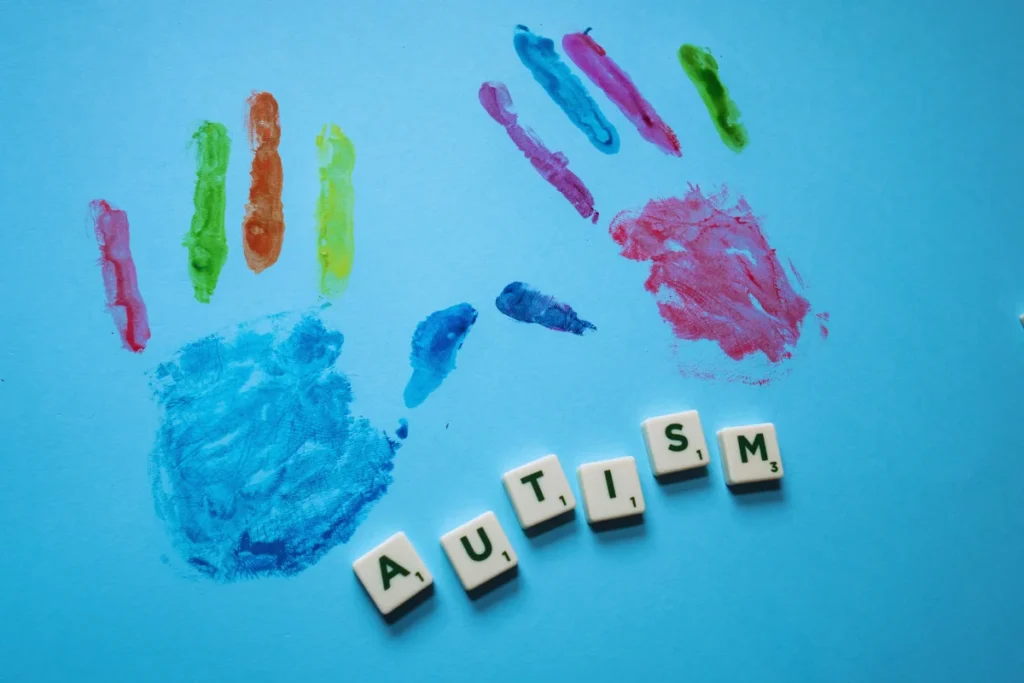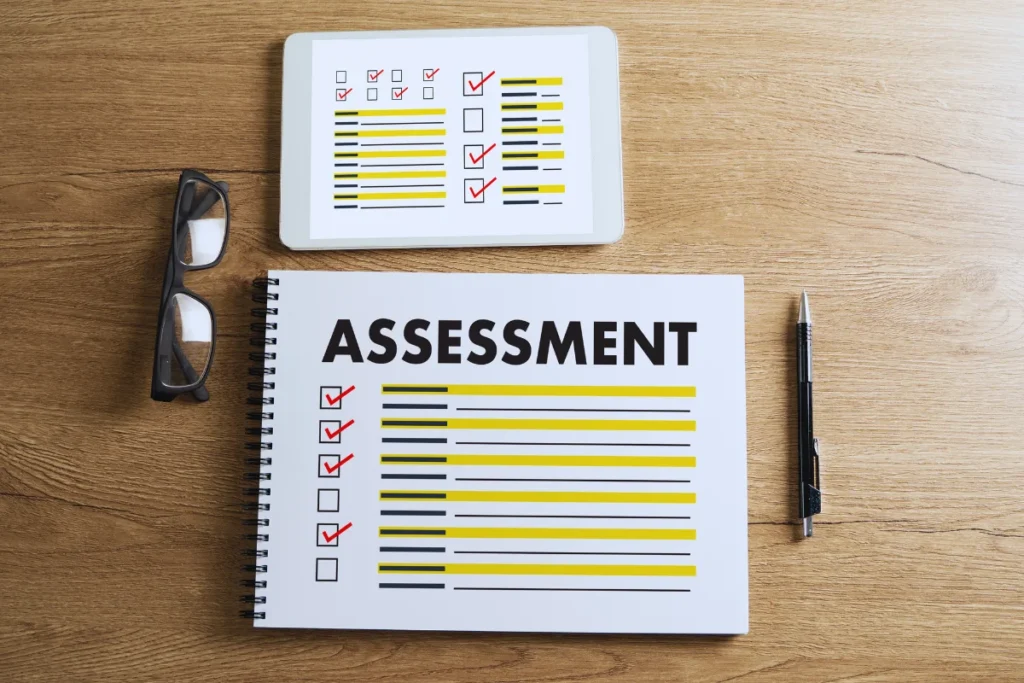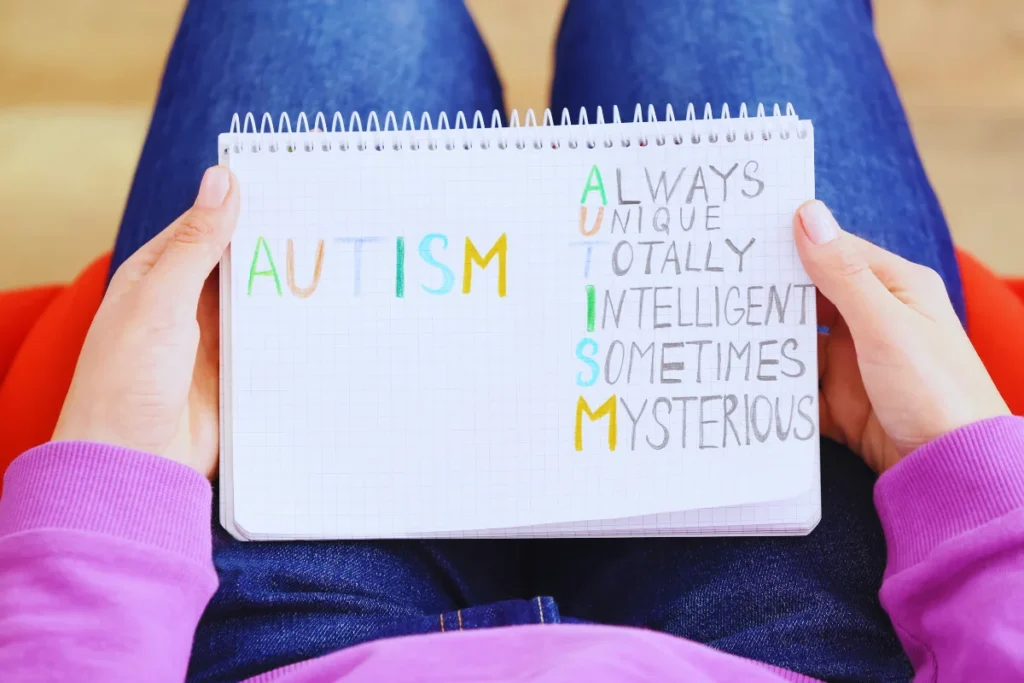Autism assessments help adults understand their strengths and challenges. Knowing what questions are asked in an autism assessment helps make the process clearer and less stressful.
These evaluations offer insight into behaviour and needs, helping individuals access support that improves daily routines and overall well-being.
What Happens During an Autism Assessment?
An autism assessment for adults is a step-by-step process. It collects information about behaviour, communication, and sensory experiences. The goal is to identify traits linked to autism. Here’s a breakdown of the process:
Stages of Assessments for Adults with Autism
| Stages | Details |
| Pre-Assessment Preparation | 1. Complete questionnaires about your history and challenges. 2. A family member or someone who knows you from childhood may also complete a form. 3. These forms provide valuable insights into your developmental history and current behaviours. |
| Initial Appointment | 1. A brief session (up to an hour) to discuss experiences. 2. Topics include: -Challenges in social interactions. -Sensory sensitivities (e.g., reactions to sounds or bright lights). -Patterns of repetitive behaviours or strict routines. -Helps determine if further evaluation is necessary. |
| Comprehensive Assessment | 1. A detailed session is often split into two parts: -One part focuses on the individual, including questionnaires and discussions. -The other part involves a family member or close friend to share developmental insights. 2. Professionals observe: -Communication style and interaction patterns. -Emotional responses and coping strategies in different scenarios. |
Autism and learning disabilities are often confused, but they differ in how they affect individuals. Learn more about the difference between autism and learning disabilities on our website.
Common Questions Asked in Autism Assessments

During autism assessments, professionals ask detailed questions to understand behaviour, communication, and sensory experiences. Here are the common areas covered and sample questions under each category:
| Stages | Sample Questions |
| Developmental History | – When did you start speaking or walking? Were there any delays? – Did you display any repetitive behaviours or unique habits as a child? – How did you interact with family members or peers during childhood? – Were there any challenges in school, such as difficulty following instructions or maintaining focus? |
| Social Interaction and Communication | – Do you find it hard to make or maintain friendships? – How do you handle conversations with strangers or in groups? – Do you often feel misunderstood during verbal exchanges? – How comfortable are you with interpreting facial expressions, gestures, or tone of voice? |
| Sensory Experiences and Behaviours | – Are you sensitive to loud sounds, bright lights, or strong smells? – Do you feel overwhelmed in crowded or noisy environments? – Do you engage in sensory-seeking behaviours, like touching specific textures or repetitive movements? – How do sensory challenges impact your daily life or routines? |
| Routines and Repetitive Behaviours | – Do you have specific routines you like to follow every day? – How do you react if your routine is disrupted? – Do you engage in repetitive actions like hand-flapping, rocking, or arranging items? – Are there particular hobbies or interests you focus on intensely? |
These common autism assessment questions help professionals create a detailed profile of traits and challenges, guiding accurate diagnosis and support planning.
Outcome and Next Steps

- After the assessment, you may receive feedback immediately or attend a follow-up session to discuss the results.
- Recommendations may include therapy, support groups, or additional evaluations to address identified needs.
Knowing what happens at an autism assessment gives clarity and helps prepare for the process. The insights gained can guide meaningful support for adults with autism.
Planning a move into a care home can feel overwhelming, but having a clear checklist for moving into a care home can simplify the process and ease the transition.
There are many types of care homes available, each designed to meet specific needs. From residential care to specialised autism support, it’s important to choose the right option.
Reevaluation or Challenging Results
If the results of an autism assessment don’t align with your personal experiences, it’s important to take steps to clarify and address your concerns. Here’s what you can do:
- Request a Second Opinion
- If you feel the results don’t reflect your traits or challenges, consider consulting another professional.
- A fresh perspective from a different assessor can provide additional insights and possibly a more accurate diagnosis.
- Clarify Findings
- Schedule a follow-up discussion with the original assessor to review the findings.
- Ask for detailed explanations about how conclusions were reached and which criteria were used during the evaluation.
- Try Private Assessments
- If necessary, seek a private autism assessment for a more thorough evaluation.
- Private assessments may include additional tests or a different approach, offering further clarity about your condition.
How to Prepare for Autism Assessment
Getting ready for an autism assessment can help you feel more confident and make the process smoother. Here’s a checklist of practical tips on how to prepare for an autism assessment:
Checklist for Preparation
- Gather Documentation:
- Compile medical records, including past diagnoses or treatments.
- Note down examples of behaviours that concern you, such as sensory sensitivities or communication challenges.
- Prepare a list of questions to ask the evaluator, such as what to expect during the assessment.
- Practice Openness:
- Reflect on your experiences with social interactions, emotions, and routines.
- Think about how sensory stimuli like lights or noises affect you.
- Be ready to share challenges you face in daily life, such as difficulties at work or in relationships.
- Involve a Support System:
- Bring a trusted friend or family member who knows you well.
- They can provide additional insights, especially about your developmental history.
- Their presence can also provide emotional reassurance during the assessment.
- Prepare Mentally and Emotionally:
- Rest well the night before to feel alert and focused.
- Practice relaxation techniques, like deep breathing, to stay calm.
- Know the Process:
- Familiarise yourself with the stages of the assessment, including questionnaires, interviews, and possible tests.
- Understanding the steps can reduce anxiety and help you participate fully.
Benefits of an Autism Diagnosis
Receiving an autism diagnosis can provide clarity and open doors to valuable resources. Understanding what happens at an autism assessment is the first step toward accessing these benefits. Here’s a look at the key advantages and their impact:
| Benefit | Impact on Daily Life |
| Access to Support Programs | Eligibility for therapy, counselling, and social skills training to address unique challenges. |
| Improved Self-Understanding | Helps individuals and families better understand behaviours, strengths, and areas needing support. |
| Workplace Accommodations | Employers can offer adjustments like flexible hours or quiet spaces to support productivity. |
| Educational Support | Access to specialised learning plans, tools, and resources for better academic outcomes. |
| Enhanced Emotional Well-Being | Reduces stress by offering strategies to manage sensory or social difficulties. |
| Community Resources | Opportunities to connect with support groups, workshops, and peer networks for shared experiences. |
Conclusion
Preparing for an autism assessment is a meaningful step toward understanding unique challenges and accessing support.
These evaluations provide valuable insights into behaviours like autism anger problems, sensory sensitivities, and communication struggles, helping individuals and families navigate daily life more effectively.
If you’re looking for autism care homes in London, Metro Care UK is here to help. Our compassionate team provides personalised care and practical support to meet your needs. Visit our website to discover how we can assist you or your loved one in living a more comfortable and fulfilling life.
Frequently Asked Questions (FAQs)
What to prepare for an adult autism assessment?
Bring medical records, past evaluations, and examples of specific challenges you face in daily life. This information helps professionals understand your experiences better. Ask a trusted family member or friend, especially someone who knows your developmental history, to join you.
They can provide additional context about your early years. Prepare a list of questions or concerns to discuss during the assessment to make the most of your time with the evaluators.
What are the 12 signs of autism in adults?
Common signs of autism in adults include:
1. Difficulty with social interactions.
2. Preference for routines and dislike of changes.
3. Sensory sensitivities to noise, light, or textures.
4. Trouble interpreting body language or facial expressions.
5. Repetitive behaviours or interests.
6. Challenges in forming or maintaining relationships.
7. Intense focus on specific topics or hobbies.
8. Difficulty managing emotions or anxiety.
9. Tendency to avoid eye contact.
10. Struggles with time management or organisation.
11. Strong reliance on structure for daily tasks.
12. Overwhelm in busy or noisy environments.
What happens during an adult autism assessment?
The process starts with questionnaires about your behaviours, social interactions, and sensory experiences. You’ll then have one-on-one interviews to discuss your developmental history and current challenges.
Professionals may observe how you communicate, handle routines, and respond to sensory stimuli. Finally, you’ll receive a report summarising their findings and recommendations, which might include therapy, support programs, or additional evaluations.
What does undiagnosed autism look like in adults?
Adults with undiagnosed autism often experience difficulties in social situations, such as maintaining relationships or interpreting social cues. Sensory sensitivities, like being overwhelmed by loud sounds or bright lights, are common.
A preference for routines and discomfort with unexpected changes may also be present. Emotional regulation can be a challenge, and individuals may feel anxious or stressed in certain environments. They often have an intense focus on specific hobbies or interests, which can be both a strength and a source of isolation.
Why is an autism diagnosis beneficial for adults?
An autism diagnosis can open doors to valuable support, including therapy, workplace adjustments, and specialised services. It provides clarity for individuals and their families, helping them understand behaviours, strengths, and areas of difficulty.
With the right guidance, adults can develop practical strategies to manage sensory sensitivities, improve communication, and handle daily challenges more effectively.

